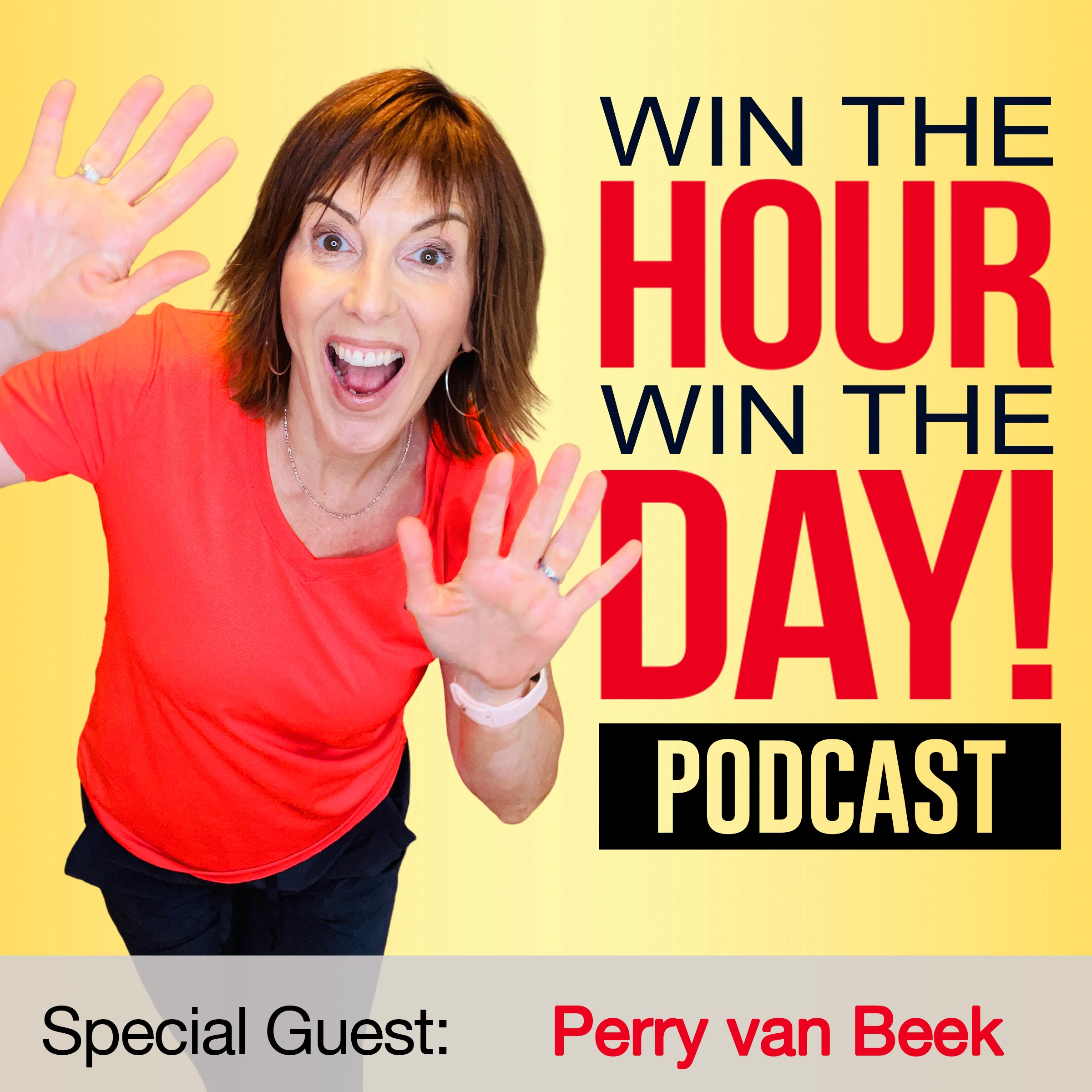Episode Summary This week’s episode of Win The Hour, Win The Day Podcast interviews,...

Are You Ready For Your Next Big Win?
Know your entrepreneur personality and I’ll take it from there!
Recent Podcast Episodes
Slow Down to Speed Up: Repurpose Video Content with Jeff Sieh
Episode Summary This week’s episode of Win The Hour, Win The Day Podcast interviews,...
Virtual Assistant Hiring Secrets: Leadership that Drives Success! with Wally Malaque
Episode Summary This week’s episode of Win The Hour, Win The Day Podcast interviews,...
Boost Your SEO: Leveraging Pinterest as a Powerful Search Engine! with Meagan Williamson
Episode Summary This week’s episode of Win The Hour, Win The Day Podcast interviews,...
Transform LinkedIn Posts into Binge-Worthy Stories with David Young!
Episode Summary This week’s episode of Win The Hour, Win The Day Podcast interviews,...
Leading Virtual Teams: Angelene Balansag on Empowering Workspaces
Episode Summary This week’s episode of Win The Hour, Win The Day Podcast interviews,...
Unlock Virtual Event Success: Michael Tucker’s Expert Strategies
Episode Summary This week’s episode of Win The Hour, Win The Day Podcast interviews,...
Power Your Podcast: Key Guesting and Marketing Tips! with Kamie Lehmann
Episode Summary This week’s episode of Win The Hour, Win The Day Podcast interviews,...
Unlock LinkedIn Success: Harness Sales Navigator Today! with Perry van Beek
Episode Summary This week’s episode of Win The Hour, Win The Day Podcast interviews,...
Boost Your LinkedIn Impact with Video Communication Tips! with Troy Hipolito
Episode Summary This week’s episode of Win The Hour, Win The Day Podcast interviews,...
Master Communication and Power Persuasion Skills with David Tyler
Episode Summary This week’s episode of Win The Hour, Win The Day Podcast interviews,...
The Power of Storytelling: Master Video Branding with Elin Giczi
Episode Summary This week’s episode of Win The Hour, Win The Day Podcast is...
Selling Sincerely: Blake Binns on Real Connections in Sales
Episode Summary This week’s episode of Win The Hour, Win The Day Podcast is...
Preventing Burnout with Smart Work Tools! with Kris Ward
Episode Summary This week’s episode of Win The Hour, Win The Day Podcast is...
Master Social Selling: Heidi Medina’s Strategies for Engagement
Episode Summary This week’s episode of Win The Hour, Win The Day Podcast is...
Boost Productivity and Master Storytelling! with AmondaRose Igoe
Episode Summary This week’s episode of Win The Hour, Win The Day Podcast is...
Master Video Marketing: Top Tips for Entrepreneurs with Dan Bennett
Episode Summary This week’s episode of Win The Hour, Win The Day Podcast is...
Boost Your LinkedIn Strategy with AI Tools for Enhanced Productivity! with Joe Apfelbaum
Episode Summary This week’s episode of Win The Hour, Win The Day Podcast is...
Mastering Personal Branding with NLP Techniques! with Olesija Saue
Episode Summary This week’s episode of Win The Hour, Win The Day Podcast is...
Innovative Lead Generation and Email Automation Secrets with Jennie Wright
Episode Summary This week’s episode of Win The Hour, Win The Day Podcast is...
PR Strategies for Diverse Entrepreneurial Impact! with Jennifer Singh
Episode Summary This week’s episode of Win The Hour, Win The Day Podcast is...
Convert More Clients on LinkedIn with Richard Moore
Episode Summary This week’s episode of Win The Hour, Win The Day Podcast is...
Master Business Growth on Pinterest with Meagan Williamson
Episode Summary This week’s episode of Win The Hour, Win The Day Podcast is...
24/7 Sales Boost: Video Marketing Secrets with Alex Sheridan
Episode Summary This week’s episode of Win The Hour, Win The Day Podcast is...
Master Public Speaking Tips with Nausheen Chen!
Episode Summary This week’s episode of Win The Hour, Win The Day Podcast is...
How To Use Video Bring Cash Into Your Business! with Sheryl Plouffe
Episode Summary
Sheryl Plouffe is a former TV Broadcaster so she knows a thing or two about getting your message out. She is the founder of Cash On Camera and teaches entrepreneurs to use their videos to create a constant revenue stream for their business.
Learn:
– how to become the authority in your niche
– the most common mistakes entrepreneurs make using video
-how to reach your audience in a way your competitors don’t
Join The Community: https://www.facebook.com/groups/WinTheHourWinTheDay/
Win The Hour, Win The Day! www.winthehourwintheday.com
Podcast: Win The Hour, Win The Day Podcast
Facebook: https://www.facebook.com/winthehourwintheday/
LinkedIn: https://www.linkedin.com/company/win-the-hour-win-the-day-podcast
You can find Sheryl Plouffe at:
Website: https://www.sherylplouffe.com/
Facebook: https://www.facebook.com/sherylplouffe
Email: sheryl@sherylplouffe.com
LinkedIn: linkedin.com/in/sherylplouffe
Masterclass: Working Hard Sucks And It’s Costing You Money!
https://winthehourwintheday.com/working-hard-sucks-and-its-costing-you-money-masterclass
Win The Hour Win The Day
https://winthehourwintheday.com
Check out the Outsourcing Playbook For Busy Entrepreneurs here: https://winthehourwintheday.com/outsourcing-playbook
Sheryl Plouffe Podcast Transcription
[00:08:52]Kris Ward: Well, the good news about you is if you were anybody else, you don’t get a second chance. Not in life, but with the podcast, it’s like, you can’t get it here, whatever. But when you’re working on it and you’re paying me to work on it, I’m like, yeah, you got a free pass.
[00:09:09]Sheryl Plouffe: Well, it’s funny because in my calendar it said one, no.
[00:09:13] Yeah. I was like, no, it said two. I was like, what? No, the emails had two and the phone said one. So then I was like, oh crap. I better jump in from. Anyway, that was that. But anyway, nonetheless, here we are.
[00:09:31]Kris Ward: I wonder maybe the calendar was set up prior to the time change. And maybe it messed you up the calendar thing. Doesn’t always work. All right.
[00:09:44]Sheryl Plouffe: And I’m gonna put a little bit of gloss or
[00:09:45]Kris Ward: Excuse me though. The back wall. Are you coordinated with your back wall? What are we doing there?
[00:09:52]Sheryl Plouffe: You noticed.
[00:09:53]Kris Ward: Yeah, I did. What is that?
[00:09:57]Sheryl Plouffe: It’s actually called a, it’s called an RGB light.
[00:10:01]Kris Ward: Okay. Oh yeah, yeah, yeah, yeah. Okay.
[00:10:04]Sheryl Plouffe: And so you’re like, it’s this one’s cool because it’s magnetic.
[00:10:06]Right, right. Yeah. Yeah, my chair’s magnetic. Okay. Put it on the bottom rung. And then what it does is it just provides a glow at the back.
[00:10:19]Kris Ward: Yes, it’s beautiful. Okay. So hold on. Now, the other thing you didn’t knew is when we met originally, I had CC’d you on an email cause I did the whole form for you instead.
[00:10:34] So I need your bio, the other stuff you can do later, but I had sent you and Ruby. I said, look, I’m going to cut your pass.
[00:10:40]Sheryl Plouffe: I gave it to Ruby. I said, okay.
[00:10:43]Kris Ward: Ruby’s the problem then Ruby’s right. Was a big dog trouble.
[00:10:47]Sheryl Plouffe: I just texted you back or wrote you back. But I looked back in my correspondence and I see it there.
[00:10:51]Kris Ward: Oh, I didn’t see. Okay. No problem. My apologies.
[00:10:55]Sheryl Plouffe:That’s okay. So this is at 12, March 23rd at 12.
[00:11:01]Kris Ward: Here. I have suddenly it’s in there now. It wasn’t in there a minute ago.
[00:11:05]Sheryl Plouffe: It’s a black and white photo. Yeah. It’s a gorgeous photo, but I wasn’t there a minute ago. So let’s figure that out. No worries.
[00:11:11] No, no, I got it. I found it. It was here and I looked earlier and it wasn’t now, I guess, I don’t know what that was. Okay. Who knows? There’s a lot. There’s a lot. Yeah. It’s a lot of, a lot, a lot of moving parts. I get it. Okay. Also too, just when you came, we just switched our system for the podcast.
[00:11:43] So it wasn’t a hundred percent sure. Which side of that you were on.
[00:11:50]Sheryl Plouffe: What do you use now for your podcasts?
[00:11:52]Kris Ward: No, it was just the process. Not like the way we roll it out. Yeah. Okay. All right. So remind me, I was looking at her notes. Cause now I feel like it’s kinda like,when you go back to dinner with someone where like, with your spouse, like, this is where he met. I’m like, oh my gosh, I was looking at my notes.
[00:12:11] Oh, that’s when we met, because I was like, oh, she’s on the podcast. Oh, right. We chatted. We redeemed to hear the podcast.
[00:12:22]Sheryl Plouffe: I think if I go back on. Okay. So..
[00:12:26]Kris Ward: No, I have the notes. So what I want to do is have some notes here. Be seen as authority. As a broadcaster, you’re an employee relationship. Your belief is a broadcaster.
[00:12:34] You’re their own entrepreneur. So I’ve got some notes here of why things you said, just want to get clarity on the angle. Are we talking about showing the power of you should be the authority using video or being video ready? Which angle do you want to go?
[00:12:50]Sheryl Plouffe:I like the authority piece.
[00:12:52]Kris Ward: That’s fine. Whatever you want. I’m just asking. I like that one better too. Okay. Yep. I just wanted to make sure I had the angle correct before I started and
[00:13:00]Sheryl Plouffe:I really can go in any direction, like, but I like that. That’s the part that’s probably, you know, it’s all relevant, but it’s, it’s particularly relevant today, I think
[00:13:13]Kris Ward: Yeah, a hundred percent.
[00:13:14] Okay. Okay, let me start. Okay. Oh, let me, oh my God. Sheryl, get back in the head. I’m just chatting with you like we’re friends, but I have a process, get back in the process here. Hold on. Oh, it’s just Sheryl. Okay. Hold on one sec. Pedef ticket calendar. We noticed checking my display or like, oh, let me go.
[00:13:44] Perfect. Do you know, while you do that? I can’t help, but tell you, cyber information. My life completely changed when I went to a standing desk. Completely.
[00:13:57]Sheryl Plouffe: It’s funny you say that because mine obviously is not a standing desk, but I’ve seen these, these desks, hot desk things that turn it into a standing desk.
[00:14:07] And when I was doing voiceover work and things like that, I would always, they would, they would actually have seats in the, in the sound booth, but I always stood. Yeah. It just sounds better when you’re standing, you know, so yeah.
[00:14:21]Kris Ward: What I found is a couple of things and I wish people had told me this sooner, first of all, like, you know, you’re on the computer all day and you’re like this, right?
[00:14:28] And then all of a sudden I realized, like when I would drive from Ontario to PEI to visit my grandma, ah, this feels like a long drive. And I thought, well, it’s the same thing. And so I was really hesitant because I thought, well, wait, what if I pay all this money for standing desks and all this stuff.
[00:14:41] But aside from my shoulder pain, I never had it again. The other thing I found is when you’re sitting in your chair, especially if you’re writing or doing work for a bit, you get all curled up in your chair or whatever. And I think, oh, the next time I get up, I’ll get fat. Right? And so you, you know, you wait until you unfold yourself for the next trip off to do stuff.
[00:14:59] Whereas when I’m standing, I’m like I get this and moving here, my body’s more in motion. And I think it keeps me more alert. But the other thing I’ll tell you too, is I’m not standing in a locked position. I have this. Which makes all the difference. Don’t know if you’d see it as a little foot rocker. Oh, okay. I see that.
[00:15:17] I think made all the difference. So it’s not just me standing. It’s me, I can swing my, I swing my foot back and forth all day long, which again is great for my mobility, but I’m not just here now. I’ve got a different, bad posture. Cause I’m constantly in movement because I’m switching feet. Like I don’t even realize I’m doing it, but yeah.
[00:15:33] I realized that on the weekend, when I cleaned my office and the Monday I’m talking to somebody and I reach for it with my foot and like, where the hell is that, you know? So it makes, it really made a difference. I was really surprised how much a difference it made.
[00:15:46]Sheryl Plouffe: Yeah. Yeah. And it may be something that I’m going to maybe look at doing too, is, I have a, quite a large, stable desk, but yeah. Desktop ones, even that you can put in front.
[00:15:59]Kris Ward: Yeah. Yeah, well, you can just put it on top of a kitchen table. Like it doesn’t have to be the standing part, just lifts it. You don’t need a desk desk, you just need something bigger to put it on. And then it goes up and down different Heights and whatever, but it really is quite something I will never go without it again.
[00:16:13] All right. So the first thing we’re gonna do is we’re gonna fill out papers there. We’re gonna do it, here we go.
[00:16:24] Okay. Perfect. I’ll make sure that my earbuds are here.
[00:16:32] We’re almost there.
[00:16:49] Okay. Can you say something? Just testing what? Your buds?
[00:16:52]Sheryl Plouffe: Yeah, testing one, two, three, four, five, six, seven, eight, nine, ten one.
[00:16:56]Kris Ward: Hold on. Can I hear you at all?
[00:17:03] Can you hear me? Let me see if I can hear you.
[00:17:05]Sheryl Plouffe: Testing 1, 2, 3, 4, 5, 6, 7, 8, 9, 10.
[00:17:09]Kris Ward: Yes. Yeah. Oh, there we are. Okay. Sometimes I find them like halfway through an interview. I’m like grandma realized I have the earbuds in, but it’s on the computer. So in fact I’ve put his earplugs in, right. I’m like, oh great.
[00:17:22] You can hear me. Okay. Yes. It’s going to cure you in my head.
[00:17:29] Okay. So. Okay. Sheryl Plouffe. I just want to make sure I got it. Sheryl Plouffe plot for Ploof.
[00:17:41]Sheryl Plouffe:Well, I say Pluff but if you say Ploof, it’s totally fine. Pluff is French Canadian okay. Or you’re Canadian. That’s right? So I’m from Timmins. Oh, there you go. You and Shanaya. Yeah.
[00:17:58]Kris Ward:Okay. Okay. So my human is they’ve been in business usually about five years service-based business.
[00:18:03] Very similar to you, small team, all that stuff. So I just point that out. Sometimes people go to, they lean to the quick example of like, say you’re, you know, iTunes or say you’re apple. It’s like, oh, my clients are apple. Don’t use that as an example. So we are good. But I’m probably telling you the wrong person, miss broadcaster.
[00:18:24]Sheryl Plouffe: Okay. No, that’s good to know.
[00:18:29]Kris Ward: My hair is not, I thought of you today. Cause I was like, oh, I need a haircut. I’m having a bad hair day. I was like, oh, Sheryl has really good hair.
[00:18:38]Sheryl Plouffe: I just bought scissors on Amazon too. So I can cut my bangs. There’s like myself, what are we going to do? We can’t go to a heritage of justice. We’ll see how it looks next week. I’m going to cut it myself.
[00:18:49]Kris Ward: Well, it looks stunning now I would leave it to be, but anyhow, that’s just my thought. Okay. You got TV hair, how it all just falls in different places. Nicely. Yeah, mine doesn’t do that. Okay. Okay. Now I’ve got to say it again. Plouffe, Plouffe fluff. Yep.
[00:19:15] Okay.1
START…
[00:19:21]Kris Ward: Hey, everyone. Welcome to another episode of Win the Hour, Win the Day. I am your host Kris Ward. And today I am super excited. We have Sheryl Plouffe in the house. She is a video coach. She’s a video producer. She’s a former TV broadcaster, and she’s been seen by millions as all TV broadcasters have. And she says she’s been in the field about twenty-five years, but hello.
[00:19:46] Ah, she must’ve started really young. So anyhow, we’re super excited to have her here today, so she can really, well, I’ll let her tell us what she’s going to teach us. Sheryl, welcome to the show.
[00:19:57]Sheryl Plouffe: Thanks so much, Kris. The truth is I did start young. I was 18 years old when I started hosting a newsmagazine program, So I really did get started early.
[00:20:07] I’ve spent 25 years in broadcasting and now what I do is really take the best practices from that industry and bring them into the entrepreneurial world.
[00:20:16]Kris Ward: Well, I am super excited. Let’s get started. All right. I’m giving you the mic cause you’re used to being, you know, full on, in charge with the microphone.
[00:20:25] Where do you want to start? What do you think, you know, what’s the biggest oversight or misses that we’re making as entrepreneurs as far as video and the whole authority aspect of it?
[00:20:36]Sheryl Plouffe: Well, I think it starts from the… People just don’t start. I guess that’s where we start where they don’t start.
[00:20:45] That’s the problem. I think so many people are stuck in their perfectionism. They want everything to look professional and the truth is at some point you’re going to have to dig deep and you’re going to have to find the courage to do it. Despite not having everything aligned. You are not going to have 100% clarity before you do your first video.
[00:21:07] Accept it, own it, and do it anyway, work past the fear and work through that, that apprehension that you have and those limiting beliefs that you might have about yourself and just get out there and start talking. And it’s interesting, Kris, because I used to teach it in a different way. I used to teach more along the lines of, ‘okay, here are the editing apps and the technology, and here’s how to edit and I can still do that.’
[00:21:32] But what I’m realizing now in the COVID and hopefully soon to be Post COVID world is that I need to help support people to be better speakers on camera and that’s fundamentally different. So it is not about performing on camera and it’s not even really about scripting. It’s really about speaking, speaking with authority so that you can be seen as a leader, as an expert in your niche.
[00:21:56]Kris Ward: Yeah, you’re still right. I talked about that, talking about that as talking versus presenting and speaking at somebody. And I think though, you know, I was fine back in the day. Somebody asked me to do a speaking gig and I’m still totally okay. Like I do that. No problem where I struggled going online with videos initially not anymore is I felt like, well, they asked me to be at that speaking gig, you didn’t
[00:22:22] ask me, like, as you’re scrolling by on whatever platform we’re on and social media. And I felt like I was tugging at your sleeve though. Woo. Over here, over here. And then, because you are, I felt in my head self imposing myself into the world, I did get caught up in the fact that it should be shoulders back and I should be professional, which came off as unbelievably dry, boring, all that other stuff. Right. So you’re so right on that one for sure.
[00:22:49]Sheryl Plouffe: One of the things that we pride ourselves on doing is positioning people as authorities, as experts at what they do, but doing it in an authentic way. Doing it in a conversational, natural, conversational way. That’s what works today. People are not there.
[00:23:04] They’re not as engaged with the corporate promotional video from the 1990s of people sitting stoically at the camera and reading from the teleprompter. Nobody wants to hear that anymore. Right. They want to hear the real goods. And I think it’s like, what you, what you just said, you know, about getting out there and, you have to just at some point yeah. Pull the bandaid, right. And just get out there and just start speaking about your topic.
[00:23:35]Kris Ward: Yeah. And that’s really interesting to me because you know, what I also found too is nowadays when I’m doing something, the videos that I stumble on, or I find a bit wordy or that didn’t flow as well, I realized, oh, that’s a problem with my messaging.
[00:23:48] And I don’t know that until I try it. It’s, you know, and here’s the deal people. If you wait all week to get, let’s say you’re, I don’t know how many, let’s say sales calls you get in a month. That’s it. They come, they buy, they don’t buy, they leave and you get to finesse or work on your language. But the costs are a bit higher because you may have not made the sale.
[00:24:09] But what I found with doing video is then I’m figuring out how to say things better and better, and especially on some platforms and with less and less time. And that’s such a help to me.
[00:24:21]Sheryl Plouffe: It’s speaking in soundbites. Yeah. So that is a skill set that we, as journalists, as professional broadcasters, get the advantage of working on for years and, you know, becoming better at speaking in sound bites is a skill set in and of itself.
[00:24:38] And it’s interesting what you said earlier about scroll. We have people who are scrolling through social media. And gee, who am I to just show up in their feed, but you know, they have free will, they have choice. They don’t have to watch your content if they don’t want to. So I would hope that people don’t lean on that and that they don’t go, oh, I can’t put myself out there because gee, who am I?
[00:24:57] You have absolutely every right. Just like anybody else to get out there and be seen and share what you have to share. Because most of the people that I work with are purpose-driven, mission-driven typically people that are kind of maybe my age got mid-life ish in that area who were saying to themselves, gee, what more is there?
[00:25:17] Like what will the second half of my life be? I want to make a difference. I want to have meaning. I’m looking for significance, right? If we’re talking about the hierarchy of needs, And so like, it’s really just getting in there and having the confidence that isn’t easy to come by, but you have to start in order to get to confidence.
[00:25:36] One of the things I see a lot of people do, Kris, is they wait to become confident, but that’s not the opposite. It’s by doing it that you become confident over time.
[00:25:47]Kris Ward: Yeah. Yeah, you’re so right. And you know, it’s really interesting to me. First of all, the point you made is when you get out there and you do it and you do it, you find your people and you find out who your people are and you get responses from that.
[00:25:58] And then you start to see good or bad or indifferent what responses you’re getting like, oh, they’re gravitating towards this message. But actually I want them to really be interested in this. So I either have to change that or find out I have a different audience. So it really is hugely helpful. I will also say, too, with my podcast, when I read the testimonials and the ratings and the reviews, which I read every single one that people keep coming.
[00:26:20] I read them all. And, I’m so thankful that someone took the time of day to plug in, you know, very generous paragraphs. And they see that all the time that this podcast is conversational, that I’m just asking questions and it’s like a fly on the wall and it, you know, and I, cause originally, especially in the beginning, I figured even my mother’s a mother, my mother does not have the attention span to listen to this.
[00:26:43] Like I think she might’ve listened to five minutes in the beginning of the first show, like, oh, that’s nice. You’re on my phone. Right. But that’s not her jam. And so I kinda, I guess why I went in with no one’s really listening and, or maybe five business friends. So, but that’s the biggest compliment I get constantly is this conversational, raw, real unpolished dynamics.
It seems to be what they favor most. So it really leans into what you’re talking about.
[00:27:09]Sheryl Plouffe: Authenticity is really what it is. You know, you are not Kris right now in the process of interviewing me for your podcast. You’re not putting on airs. You’re not being someone that you’re not, you’re just being you.
[00:27:21] And you’re just asking questions and you’re actively listening. So you’re asking questions and you’re following up. It’s a conversation at the end of the day, and that’s what people want. They want to feel and know that we’re not trying to pull the wool over anyone’s eyes here. We’re just sharing, sharing what you know, sharing your insights, your experiences, your lessons learned, the good, bad, and the ugly, share it all.
[00:27:46] And, and at the end of the day, that’s what personal branding is. That’s what branding is, is the reputation that you leave behind. And so I think that’s ultimately what it’s really all about is authenticity.
[00:27:56]Kris Ward: Yeah. And I, sometimes that word rubs me the wrong way only because here’s the deal, is I think, well, not the way you used it, but when people reach out and say, be authentic and I think, well, nobody signs up to be inauthentic.
[00:28:10] Like I never showed up and said, oh, I’m going to be fake today. But what would happen is you have these perceptions or versions of yourself. So you know, who I was with my grandmother is very different than who I am with a business friend. Like the tones are completely different. So then I would get confused and think when I went online and a video shoulders back, let’s be professional.
[00:28:29] I’m trying to look prepared and academic and, you know, knowledgeable, but that’s not the deal. That’s not the modern day world. And maybe never was. Maybe those people looked really great in front of a boardroom, but that’s maybe that’s why they called it a boardroom. Right. So I think the whole idea of, you know, just be who you are when you’re working with somebody for six months, that’s the person you want to attract online or else there’s a big disconnect.
[00:28:56]Sheryl Plouffe: Yeah. I think sometimes marketers ruin words for one another. I think authenticity is one of those words is becoming overused, admittedly, but substitute it for whatever you see fit, like be yourself is another one. I mean, it’s at the end of the day, I guess we have to find some words to describe it, but yeah, that’s really what it is.
[00:29:14] It’s really more Kris about how you are showing up and are you showing up as. Like you fundamentally you, or are you trying to emulate or worse yet? Imitate someone else. That’s when the problems happen. Listen, I love Marie Forleo, lover. I love Amy Porterfield. I love them all, but I’m not going to go out there and go.
[00:29:38] I have to be like Marie Forleo to see success. But unfortunately you see a lot of people doing that. They’re like, well, if it worked for Marie Forleo, I must act and be, and dress and do my hair and be, I have to have the things that she has. I’ve got to have a studio like hers. I’ve got to have the flower in the right spot. People are trying to emulate and imitate other people. And it’s, that’s where I think it falls off.
[00:30:01]Kris Ward: Yeah, that’s a good point. I remember back when, you know, websites were like, people would talk like I, somebody new in business, they might say, well, the competitor just really well, and their website is red.
[00:30:12] So when you use a lot of red and I’m like, oh, that’s great. That has, it’s like, I don’t even know why, like an Olympic athlete saying, well, he wears blue sweaters, you know? So I’ll be in shape with my warm blue sweater. Right. So, okay. So what you’re saying is being that authority, being real, showing up just.
[00:30:29] Like not changing the dynamics because the camera’s on and not getting caught up in the, what I call, you know, of course, shiny object syndrome, but distraction, like I often say, you know, when you need to do something, that’s one thing. And then all of a sudden you realize, oh, I need to learn the thing before the thing before the thing.
[00:30:44] And you’re moving so far away from the goal, like, oh, now I need proper camera equipment. I need this. And I have to research that and order on Amazon. So if I’m really lucky I can postpone this thing I don’t want to do for three months. Right.
[00:30:55]Sheryl Plouffe: That happens a lot.
[00:30:56]Kris Ward: So there’s no excuses anymore with the iPhone or any phone, right. With video.
[00:31:01]Sheryl Plouffe: This happens so much because there’s fear there for a lot of people. And so what they do is they hang on to the most convenient excuse for not doing the thing that scares them. So what is the easiest thing to hang on to? I don’t have the tripod. Well, I can’t possibly do this video. Well, not my fault.
[00:31:16] I don’t have a tripod, you know? So it’s that kind of thinking that holds people back. They look for every possible thing that they can hang on to for why not to do the thing that scares them. The truth is you can go on Amazon and the thing’s on your doorstep tomorrow. So that’s no longer the reason. And the truth is that you can do it
[00:31:34] And you can start with just your phone. You don’t even need to have microphones. Eventually you want to look at those things and, but you have to start with where you’re at and start with the tools you already have and stop with the excuses and just start moving in, in the area of just taking action, imperfect action.
[00:31:52]Kris Ward: So when we started the conversation, we talked about authority. And so when do you feel that people are missing in the understanding of the value that this brings to your authority?
[00:32:03]Sheryl Plouffe: Well, I think they often don’t realize how valuable their experience is. I think that’s really ultimately it, we live with ourselves, so we have the curse of knowledge.
[00:32:15] We know what we didn’t, we intimately understand it and we think that everybody else should too. They don’t. So don’t, I’m not saying dumb it down for people, but don’t take for granted that other people, you know, already know the thing that you know, they don’t. Go up there and share it with them.
[00:32:34] And even if there are people who do know what you’re talking about, or they’ve heard you talk about that thing, maybe this is the third time they’ve heard it. Guess what, we live in the digital age. You have to hear a message. Sometimes. I think the latest stat I heard was 21 times. In order to really hear the message.
[00:32:52] It’s not like this was the 1950s where you could hear a message and advertising message seven times, and it really impacted you. Now it’s 21 times. So you have to, you know, don’t be afraid to get out there and talk about your topic over and over and over again, because people will hear certain parts of the message differently. Every time you bring it to their attention.
[00:33:13]Kris Ward: That is, you know what I call that is sometimes I forgot I knew that, oh, I forgot I knew that. I knew that. And I used to do that and I forgot. I knew it. Or sometimes it’s so simple and you think, oh, I got that. Oh, I thought I got that now. I think I really got that.
[00:33:27] And you’re right. How many times have we all in business? Ah, I know that lesson. How many times have I heard it before? It’s permanent. Like I should have a tattoo with that. It might be something so basic. Right? This is all…
[00:33:28]Sheryl Plouffe: This is something that’s been happening to me lately. I’ve been posting in my cashing on Camera Facebook group, some things that, just some tips, some ideas and tips that to me seem fundamental.
[00:33:51] And I was like, okay, well, I haven’t talked about this in awhile. Do they already know this? These people have been following me for a while. They probably know this, and then I post it and I get so many comments like, oh my gosh, great tip. Thanks so much. I did think about this. Okay. Right. So you, but I put it and I’m experiencing that right now.
[00:34:10]Kris Ward: Yeah. You know, it’s interesting because I think that’s the other thing is, we always look at, I think anyone who does something well and is passionate about it, it’s always looking at what’s so much. You want to learn, I want to learn this. I want to get to that until you forget how much you do know, and that there’s always somebody.
[00:34:26] Like it reminds me of an example once where my friend, her son, was in junior kindergarten. So he’s like four. Right. And so he can’t read yet. And he’s handing her a flyer that it’s pizza day tomorrow. And she’s reading it saying no it’s Monday. And he says, No, the seniors say it’s tomorrow. The seniors are in senior kindergarten.
[00:34:47] They’re five, right? So the four year old is arguing with the adult telling her, you don’t understand. I spoke to the authority, they know what’s going on, they’re seniors. And that sounded very academic until you realize they’re five years old, but in his world, they were far more knowledgeable and current and up-to-date than this old lady. Right. And that’s the thing. There’s always somebody out there that are, you know, that could learn from you.
[00:35:14]Sheryl Plouffe: Sometimes, you know, we’ll have to remind people, you only need to be a few steps ahead of somebody else to really be able to stand in that with and share it. You know, sometimes we go, yeah, but I’m not far enough down the path yet.
[00:35:28] So who am I? Who am I to go and share this particular nugget of wisdom? Because I haven’t been in it. You know, 10 years longer than the people that I’m going to share this with. You only need to be a step or two in front of someone to be able to come back and share, you know, pay it forward, come back and bring those people along with you.
[00:35:47] You might only need to be a couple of steps ahead of them to be able to share that negative wisdom.
[00:35:54]Kris Ward: Yeah. And then, you know, this podcast, I’ve heard from other people, when all of a sudden last year everyone took a pill and said, okay, by dinnertime, we must all own a podcast. Like all of a sudden it was ‘shhh’ exploded.
[00:36:06] And I was like, okay. And then you’ll see people that are saying here’s their podcasts, which I would have over-thought never would have been able to do this. And I’m not saying I’m right. I’m saying I would have limited myself. So you’ve got people that will start a podcast and their intro to the podcast is I’m new in business.
[00:36:24] I just started my business three weeks ago and join me on this podcast as I learn. And yeah. Bring on experts. And I know I would have, oh, and I’d be like, oh my gosh, that’s brave. Like, I would’ve, over-thought that crazy person. In fact, I had two or three people talk me into starting this podcast. And I was like, ah, does the world really need another podcast?
[00:36:45] And they’re like, no, no, you’re here. Here’s all the reasons. And you’re, and I’m like, yeah, I thank you for saying I’m a good guest, but does that mean I’m a good host? So, I was in business 12 years ahead of this guy. So it really is, you can share your journey and do anything as long as you package it and say, here’s what we’re going.
[00:37:02]Sheryl Plouffe: Well, I mean, think about pizza restaurants. Pizza restaurants in your city. There are a lot of pizza restaurants. Does that mean that there ought not to be another pizza restaurant that pops up? What if they have a special sauce? What if they have a special way of making their crust? What if they have a special twist on what they do?
[00:37:21] So sometimes I think, you know, we’re pizza restaurants. It doesn’t mean that. You shouldn’t, you don’t have a place to show up and that you shouldn’t show up because there are other pizza restaurants in the world or in your city. They don’t do it the way you do. You have a special sauce, you have a special recipe, and that’s what you need to bring to the table. That’s branding.
[00:37:43]Kris Ward: Yeah, that’s really, I think a powerful example similar to that, but not as good, I think because the whole, your special sauce really does resonate with your identity. I remember watching a presentation at an event and this marketing expert did like an hour on coat hangers. And I was like, oh my gosh, I didn’t realize, like, I would have thought, okay, we got you’re right.
[00:38:05] Here’s the coat hanger, we’re done. Right? Yeah. And then he would just do this whole thing about how this code hanger is different from that one and that one, and that they’re still designing coat hangers and you think, oh, that sounds like that market has been like, it’s over shut her down. It’s done. And I thought, wow. Like if you can, if you can redesign and find a new market for your new coat hanger, then we could all do anything, I think.
[00:38:28]Sheryl Plouffe: Everything’s been done. It’s just not done by you.
[00:38:33]Kris Ward: Right. Everybody, whatever you’re doing, if you’re driving, pull over and write that down. Okay. Everything’s been done. It’s just not been done by you.
[00:38:43] Oh my heavens. That is really, that is a really powerful statement. Okay. I don’t even know if we should keep talking, Sheryl.
[00:38:53]Sheryl Plouffe: You know, when I was a broadcaster, I was in a large TV studio with $50,000 cameras and you know, all of that. And we would have people come in on tours, you know, they would come on tours of the studio and they’re always wanting to see the talent, you know, let’s go see the on-air presenters.
[00:39:12] That was always one of the big highlights of the tour. And so they would come in and then. We would meet with people and meet and greet and chat and they would ask questions and things like that. I always took a lot of pride in hearing after the tour that the people were surprised at how we were the same off air as we were on there.
[00:39:30] And I always appreciated that feedback and cherished that feedback because I think that’s what it’s really all about. If you can be the same off-camera as on-camera. That’s authenticity. We were talking about that earlier, but that’s really what your goal is. That’s the ideal that you want to get to.
[00:39:52]Kris Ward: That is, and you know what I think that’s it, but I think that’s a big compliment to you, Sheryl, because I would have thought when you’re going and back to you at the desk, Ken, that would have been a different version of you. Like that wouldn’t have been relaxed, nice Sheryl, would have been like, okay, you know, whatever. And behind me, the road is flooded with whatever. Right. So, okay. All right.
[00:40:12]Sheryl Plouffe: We’ll I mean, having said that, you know, deliberately listen. Little bit different in that when you’re a broadcaster, you are representing their brand and you are in a position of being their ambassador for their enterprise and growing their business. Right. But the idea is to be the same person off air, as on.
[00:40:34]Kris Ward: That’s a good point. Okay. Now I get that. All right. That would explain Fox news everybody. Yeah. All right. Not just me noticing that. Okay. All right. So these are, this is really, profoundly simple, but really impactful.
[00:40:54] So what are some other things that you think we just, you know, you just don’t even know what’s in your own way.
[00:41:02]Sheryl Plouffe: Well, and we talked a little bit about confidence in that that doesn’t come about naturally necessarily, you know, you want to start taking imperfect action. I think that the third, the part that’s maybe missing is the commitment.
[00:41:17] Listen, I just got off a call before we started recording this podcast with someone who was doing the work, but then got discouraged because he wasn’t seeing what he thought were results fast enough. And I did a little analysis on his Instagram reels to find out he’s doing a kick-butt job. He’s doing an amazing job.
[00:41:38] I’m like, Ooh, look, man, you’re getting like 4,000 views on this little 15-second reel. That’s awesome. He’s like really? Is that good? So people don’t know what they don’t know. And so my encouragement to him is to stay committed. You’re on the right path. You’re doing the work. You’re putting it in.
[00:41:56] Don’t stop now. I think what happens often is people just don’t have that level of commitment. They stop too soon. Think about the hockey stick, right? It’s the hockey stick. It’s flat, flat, flat for quite a while for most people, right? It’s like, just stay the course, keep going, keep doing. And eventually it starts to turn, but too many people give up when it’s still flat.
[00:42:17] And it’s just at the cusp. You don’t know, but you might be just at the cusp of it turning and people stop too early. So it is about commitment. You have to be committed to the process and to your audience, be committed to them. And show up.
[00:42:33]Kris Ward: Yeah. And that’s so true. You think, oh, this isn’t working or like I’m embarrassed to myself.
[00:42:38] I’m putting a video out and it’s me talking to myself, but you can’t get from two views to 10. Like you can’t, you can’t even get to a hundred if you don’t start somewhere. I always think of like, a snowflake, like to me, it’s so profound where if you put your hand out and it’s snowing, get one little snowflake in your hand and it just melts, it goes away.
[00:42:57] It’s no big deal. And yet. Enough of those fall down and they just stick together, they shut down a city and you think, wow, one in my hand, it melts and we’re good. And then they combine the efforts and it just accumulates and all of a sudden, right. So I think that’s it not quitting and just whatever, like just keep going, putting it out.
[00:43:19] And another good point somebody mentioned to me too, is. You want to be thankful those first, you know, whatever week, days, months, whatever it is, where you feel like you’re not getting the views or attention that whatever you think somebody else is getting, or you heard these numbers because this is all the time you’re growing and improving in your messaging, your craft, your soundbites, all that stuff. So you’re good to go when it does start to come in.
[00:43:45]Sheryl Plouffe: Yeah. It’s a great time when you don’t have, if you’re starting out, you don’t really have a huge audience. Now’s the time to put out those first videos, you want to get out those first 25 to 35 videos, get them out as fast as you possibly can. And you’re right.
[00:44:00] I think that snowflake analogy is a good one because when you are. Well, you know, you’re just, it’s snowing and you overwhelm the surface and going back into my meteorology days here, but overwhelmed the surface to temperature at the surface. That’s when things start to accumulate and that’s when the snow starts to build, you do have to go through that quote, unquote painful period is going to happen no matter what for most people.
[00:44:27]Kris Ward: Yeah. All right. We have a few minutes left. What do you want to close up with, Sheryl? You’ve just sort of been the video gospel here or authority gospel. I mean, the version is video, but yeah. It’s yeah. Gospel. According to Cheryl, that’s all. We’ll call this one.
[00:44:44]Sheryl Plouffe: I like it. Well, I think that it is really about speaking on camera, speaking on camera with confidence and consistently, you know, being committed to the process, a lot of C words there, but I think that’s ultimately what it’s really all about.
[00:44:59] And if I can help in any way, by all means, right. Reach out SherylPlouffe.com is the website. We have a variety of dates. Different ways that we support people, but it is time. The world needs the message that you want to share. You have an impact to make through your business or through your organization or through your enterprise.
[00:45:17] But we live in the attention economy and content is the currency. So if you’re not making content, you are as good as invisible in the world we live in today. And do you want to be invisible? That’s the question.
[00:45:31]Kris Ward: No and you know what? I would also argue too, content is the currency, but there is no content, like somebody’s hearing the tone of your voice or seeing your face, or you just, how you deal.
[00:45:41] It’s not the same as writing or producing it in any other capacity. Right. It truly is, like, you know, you get to meet all these people. You had somebody say to me, she reached out, which I thought was. She sent me a message. It was on LinkedIn and she said, oh, I really love all your videos. And she started giving me all these points out how it helped their business.
[00:46:02] And I thought I’ve never seen you like any of them. And she said, I’m not something like, she’s not comfortable engaging, but she said, I want you to know. You never know who’s watching and what kind of impact you have. And I was like, huh, so you’re right. You think, I don’t even know what the conversion is, but you might have, let’s be silly and say two people comment on it, but twenty-five people saw it.
[00:46:22] So that’s the thing I thought was a very insightful thing. She said, like, you’re having a big impact on my business. You’ve never met me. We’ve never connected in any way, but you just don’t know who’s watching.
[00:46:32]Sheryl Plouffe: You don’t know who’s watching and where or when they’re going to see it. So it’s really up to us, up to you to show up. And if you show up consistently, good things will happen.
[00:46:44]Kris Ward: Fabulous. Well, we are going to put all your contact information in the show notes. People, please go over and check out Sheryl. Cause my gosh, she’s all about videos. So if she could do this on a podcast, you got to go check out her work and the people she’s working with, because it can only get better from here.
[00:47:01]Sheryl Plouffe: I’m a fan of Podcasting, you know, a lot of people are surprised to hear. Yes, I do video, but I’m a huge fan of audio. I think audio is massive. It’s going to get even bigger in the next little while here. So yeah. I’m a huge fan of podcasting as well.
[00:47:01]Kris Ward: But see, as, don’t go yet, we’re not done. But see what happens is your messaging from working it out on video, which I think is more in your face a little bit more painful when you’re starting out, not for you, but for the rest of us, even from the top of the show guys, if you go back and listen, The moment I said, you know, Hey show, blah, blah, blah. And you’re like, you’re like, oh, thank you. It’s lovely to be here.
You went right into really effective, clear cut messaging and made it for me. I was like, oh, we’re on, we’re doing this. Like, we’re going, we’re going in. This is going to be a good one. And so that’s the audio is just, that’s just another skill set you acquired and developed from, you know, all your video presentations.
[00:47:56]Sheryl Plouffe: Well, and that’s, you know, when we call our thing cash in on camera and it is that when people can become better speakers about their topic, really the world is your ocean. At that point, you can go on podcasts.
[00:48:08] You can go on anywhere. You can get on stages on virtual summits, PI, whatever you want and speak about your business and about yourself. With authority and with confidence. And so I think it’s the process of, if you, especially, if you do it on video, then you can really speak anywhere, anytime, any place.
[00:48:29]Kris Ward: Wise words from our friend, Sheryl, here. Now using my radio voice, because I’m trying to sound as intelligent as you, alright?
[00:48:36] Sheryl, you are awesome. Everyone. Check out the show notes, check her out. Lots to learn from her. I don’t even think we scratched the surface, but it was all kinds of fun, Sheryl. Thank you so very much for being here and everyone else, we’ll see you in the next episode. [00:48:53]END…
[00:48:53]Kris Ward: All right, Sheryl. Thank you. You did fantastic.
[00:48:57]Sheryl Plouffe:Thank You. That was fun. That was really fun.
[00:49:00]Kris Ward: That’s the goal we’re supposed to have fun.
[00:49:02]Sheryl Plouffe: Yeah. Yeah. I love it. I, you know, I meant what I said about podcasting too. I think it’s, it’s, uh, I love it. I think it’s great, it’s a really, really, really fun format.
[00:49:12]Kris Ward: But I meant what I said. You can tell like your skillset, you know, it’s the same skill set. Only different, like who cares if they can see you on camera or not like three seconds into this, like, oh, this is going to be like, she knows she’s got it going on. She knows what she’s doing. Right. You just dive right into meaty conversation. That’s highly articulate.
[00:49:32]Sheryl Plouffe: It’s funny. Cause like 17 years of doing live TV will do that to you.
[00:49:37] Right? It’s a lot. Like we would be on our second, you know, the weather network of the segments were six minutes long and there were ad-libbed. Six minutes is a long time to just speak from extemporaneously from your head.
[00:49:51]Kris Ward: Yeah. And it’s still raining. Like how are you guys going to go any more rain? Right.
[00:49:58]Sheryl Plouffe: Well, and shift is eight hours or like, well, a shift is eight hours, but five of those were spent on air, cause three were, were prep. And so we do what, five hours a day. On a wheel constant. And so in an hour, we were on, we would do at least at least six segments per hour for five hours per day, full time.
[00:50:19] Like, so you have to get very, very good at saying the same thing over and over in different ways because different audience, different people, some people watching for longer, some people watching. So you get really, really good at being able to say the same thing over and over. Multiple ways. In fact, it’s so interesting.
I’m saying this out loud right now. I’m like, this is a good topic for a video, so I’m actually down.
[00:50:41]Kris Ward: Yeah. Yeah. I tell people that all the time suddenly you’re going well. That was good. That sounds, I never said that before.
[00:50:47]Sheryl Plouffe: I said that before I’ve to write that down, but it’s saying the same thing over and over again in a different way.
[00:50:54] That’s the skill. I think in addition to being, and being able to say it. Ad-lib, ad-libbed in the moment without a script. That’s what the skill is.
[00:50:04]Kris Ward: But I do challenge you, because you may say that well, that’s what I’ve had other people on the show that, you know, whatever had similar jobs, if not even in the states more impactful.
[00:51:15] Cause they were in bigger. You know, bigger stations or whatever. So you make a credit to your training, but it’s your ability to absorb that and to implement it is still a skillset. Cause I’ve, there’s, that’s why I said to you about, I would never have somebody reach out for podcasts for me if I were you.
[00:51:33] And we’ll talk about that more. And when your sessions, because we do have people all the time that are really freaking smart or, oh, she was broadcasting on this channel in the states in Chicago and you get there and you are. Interesting is watching Pedro, like, just cause you’re on air doesn’t mean you’re good at it or you’re not there now.
[00:51:50] You know what I mean? So, yeah. So there is a big difference just because you were trained in it doesn’t mean you were good at it.
[00:51:56]Sheryl Plouffe: Yeah, that’s true. Yeah. Fair. Very fair. Yeah. Yeah.
[00:52:02]Kris Ward: Thank you. That’s the goal to have fun. All right. So we are good. You’re all set up for next week and you’re good to go.
[00:52:08] And, actually I’ve interviews Thursday morning for you, so we’ll see what comes out of that.
[00:52:13]Sheryl Plouffe:I have yet to respond to you about that admin thing. You had asked me a question about what would be an admin task that someone could do for you that doesn’t require them know you that well kind of a thing. I’m still thinking about that.
[00:52:28]Kris Ward: I don’t know. Yeah. Don’t panic about that. If you don’t get stuck on it. Cause I’ll pull that out of you. It’s just something that if it percolates in your mind added to the list, cause you’d be like, oh, I was wanting to do that whatever. And so then you can sort of unbox that, but don’t worry if you don’t have it. That will be my job that will not slow us down.
[00:52:49]Sheryl Plouffe: Okay. Sounds great. Thanks.
[00:52:50]Kris Ward: I will drag you over the finish line. There’s no, there’s no slot.
[00:52:51]Sheryl Plouffe: Yeah, I’m feeling good about that. It’s funny, you know, ever since, like, I am not working with my, um, assistant, you know, anymore, and it’s, it’s actually a good thing.
[00:53:04] It’s it’s really a weight, I think, off my shoulders. So it was, it’s been really good.
Yeah, because that’s, that’s, don’t even get me started, but that’s what happens with everybody. Cause they think I, okay, so then I, I have this, I hired this person. I’m trying to build this team, but then it’s almost like, it’s almost like you spend more time.
[00:53:23] Oh, you’ll appreciate this. So when I was younger, we had moved to PEI. After my parents got divorced, we moved back to Ontario after whatever. But so I had come from like, Mississauga Brampton area to a very, very small town, like 25 years ago in PEI. So they didn’t even have cable in the country at that time.
[00:53:41] So here’s the example. I was asked to babysit, uh, I’m way out in the woods. That’s fine. So they all had wood-burning stoves back then as they’re being sourced to heat. All right. So they go out and they come back and they say later how’s the kids. I had never seen a wood-burning stove beside the wood-burning stove is kindling for the winter, the logs or outside.
[00:54:03] I don’t know that. Right. I’m 16. So they come back and they say, how are the kids? The kids. I had no time to look at those kids. I’m exhausted because I was trying to keep the fire going all night with the kid lit. I was like, and here I am, because confidence has never been an issue with me. I’m thinking when they get back, I, you tell them they should make these bigger pieces.
[00:54:23] Like I have ideas I’m going to help you out. Awesome. So you’re trying to feed it all the time. And that’s what happens when you hire somebody that you’re, you pay a lot for, you don’t have the infrastructure set up to support them. So becomes stress, feeding them wood, going, okay. I’ve got her enough to do that.
[00:54:40] I got enough it’s off my plate, but it’s more, we’re getting it off my plate, giving it to her, paying her to do it. But I know this is the right thing to do because this is how you grow a business, but yet it’s very labor intensive and stressful. Whereas when we get this set up correctly, what’s going to happen is they’re going to lift you up.
[00:54:56] You won’t be looking like, am I keeping this going? They’ll be moving you forward. Yeah. Yeah. I think that’d be right. Difference. Big difference. Yeah. You know, I’m, I’m doing some, uh, some training stuff in the next few days. And one of the questions that was asked was, you know, what is an area that you’re going to want to work on?
[00:55:13] I’m like, um, team building, I’m working with someone. Figuring it out though. Thank you. Um, I’m all over. I said part of it, so yeah, maybe Chris, thank you so much. Oh, you’re welcome. I’m so glad. So what happens when the show airs? Just so you know, they will alert you, uh, they will send you all kinds of stuff.
[00:55:34] Uh, uh, graphics and links, everything like that. They usually tell you on a Tuesday and then they remind you on the Thursday. So you’ll be well-informed with all kinds of information. Okay, sounds great. All right. Awesome. I will see you next week, Cheryl. Thanks so much. Thank you. Bye. Thanks, bye.





























